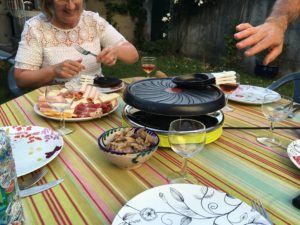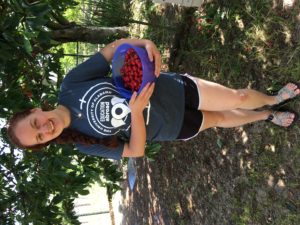When you arrive in a new country to study abroad, odds are you will have probably already given a lot of thought to the differences in culture. But I had underestimated just HOW different (and all-consuming) the French food culture is. From my first day in France, I have found myself faced with many new culinary experiences, all of which have been absolutely delicious!
When I arrived a few weeks ago in Tours, I was so grateful to have a host family who was understanding of my lack of knowledge of how to eat things. Sure, I have spent years studying French language and culture in school, but there is no way to learn absolutely everything in a classroom. Almost every night at dinner with my host family (which sometimes lasts upward of 2 hours), there has been at least one item on the table that I wasn’t sure what to do with. I’ve necessarily become very comfortable asking, “What is this?” and, “How do I eat it?”
Something that I have learned during my stay in France is that for the French, eating is not only about the food itself, but about the entire dining experience. It’s about the people, the environment, and the conversation- about coming together at the end of the day and enjoying the simple pleasure of a delicious home-cooked meal. (And I do mean at the end of the day- we eat several hours later in France than what I am used to back home!)
Since I arrived in France, I have eaten foie gras on a riverboat cruising down the Seine, violet flavored ice cream in the gardens of the Rodin museum, a french “taco” in the square by the Institute where I am studying, and eaten the “World’s Most Famous Omelette” on Mont-Saint-Michel. I have experienced fishing escargots out of their shells (they’re actually quite tasty!), harvesting cherries by hand, sharing my first “raclette,” and eating all kinds of dishes that I had never heard of before. (And I would be remiss if I did not mention that the French really do eat bread and cheese with just about every meal.)
For anyone who is just now embarking on their study abroad journey (or just visiting somewhere new), I would encourage you not to just stick with the foods that you already know you like. Instead, dare to be adventurous and try everything that is offered to you while you are abroad. Especially if you have a host family, don’t miss the opportunity to learn more about the foods that you are eating by asking questions. (This is incidentally also a great way to get the conversation flowing at the dinner table.)
Food is necessary to life, and is therefore an important part of every culture. While you’re abroad, immerse yourself in as many new culinary experiences as you can. You may be surprised at how many of them you’ll want to bring back home with you!


